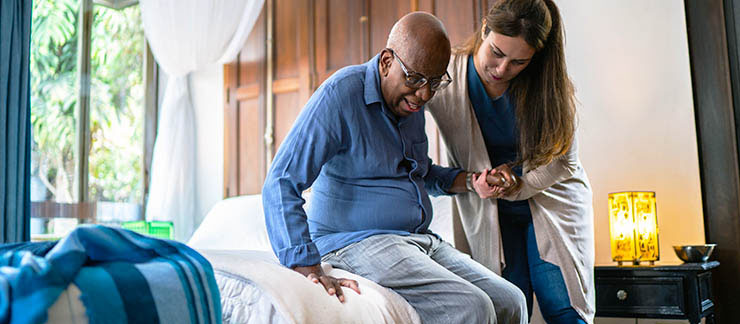
In-Home Personal Care Can Complement Home Health Care
“Home health care” and “in-home personal care” may sound similar, but they are actually two distinct, commonly confused services. Unless you or a loved one has previously used these services, you may not be aware of the differences between the two home care terms and how each can benefit the older adult in your life.
These services — and how they can be used together — can help you develop a home care plan that surrounds your aging loved one with supportive, compassionate senior care, especially if they are living with a medical condition or recovering after an illness, surgery or injury.
What is Home Health Care?
Many older adults who are living with a chronic or acute health condition receive home health services, including:
- Wound care
- Intravenous (IV) or medication therapy
- Injections
- Rehabilitation
- Health monitoring services
These medical services are delivered at a patient’s residence by a skilled medical provider, such as a registered nurse (RN), a licensed practical nurse (LPN), licensed home health aide who is under the supervision of an RN, or a physical, occupational or speech therapist.
Home health care may be paid for by Medicare or another insurance company and is ordered and directed by a physician. Some insurance plans may have eligibility limits that restrict the number of covered home health visits per year.
The frequency and duration of visits are decided by the physician based on the patient’s needs, but home health care visits are generally short-term and intermittent. Visits intend to accomplish a specific task for as long as the patient is ill or recovering. Examples of tasks include administering an IV infusion once a week or doing a physical therapy session for an hour three times a week.
What is In-Home Personal Care?
In-home personal care provided by Visiting Angels includes non-medical services delivered by professional, trained personal caregivers. Instead of being directed by a physician, services are directed—and often paid for—by the older adult and their family. This enables the family to determine how often and for how many hours they want a personal caregiver to be present in the home.
Although personal caregivers are not licensed to provide medical care, they can assist with an older adult’s everyday needs, including:
- Companionship and socialization
- Transportation
- Personal grooming, such as bathing and dressing
- Toileting
- Meal preparation
- Medication reminders
- Errands, such as picking up medication and grocery shopping
- Light housekeeping
How Can In-Home Personal Care Combine With Home Health Care?
Although in-home personal care and home health care address unique needs, they can be combined to provide a full spectrum of senior care.
Personal caregivers can work longer hours and assist a senior when home health care providers cannot. Personal caregivers can also remind older adults of home health appointments, assist with medication reminders and serve as the “eyes and ears” for the family and home health providers. In fact, Visiting Angels has developed a coordination-of-care tool to foster collaboration between staff members and home health case managers.
After an older adult recovers, many families continue to use in-home personal care services to provide consistency for their senior and peace of mind for them.
In-Home Personal Care Can Make an Impact
Whether your older adult is living with an illness or injury or is enjoying robust health, an in-home personal caregiver can make a real difference in your senior’s life. To learn more about how a Visiting Angels caregiver can assist with your senior’s care, schedule a no-cost, no-obligation in-home assessment with your local home care agency.



